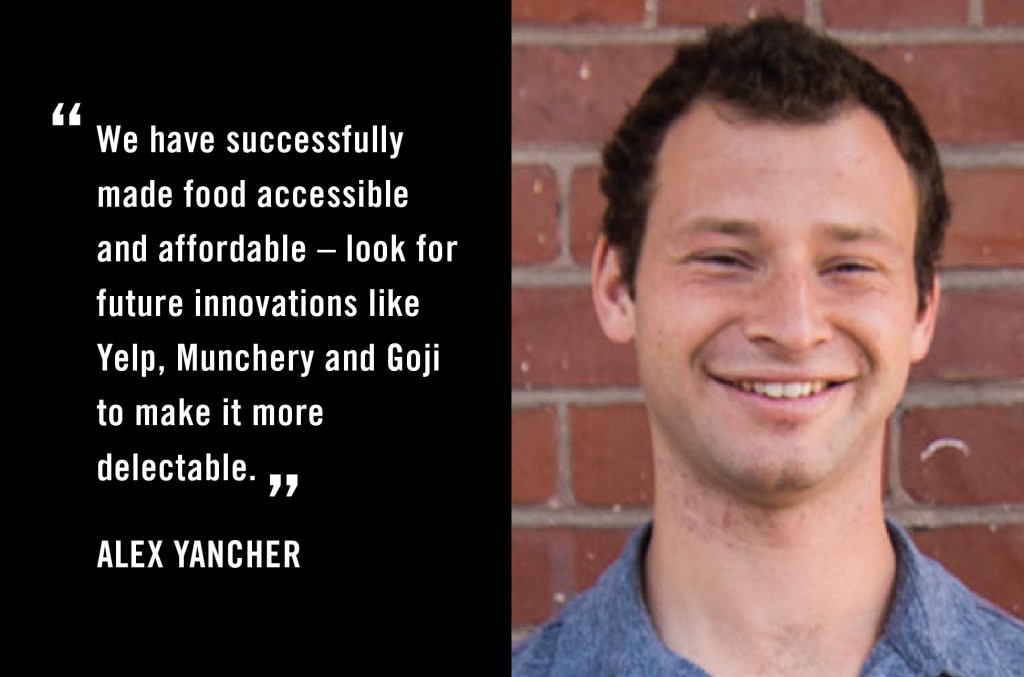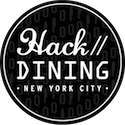Guest post by Alex Yancher of Pantry. The views expressed here are solely those of the author and do not reflect the views of Food+Tech Connect.
A market with a ‘lemon’ problem occurs when there is uncertainty about a product’s quality before the purchase decision is made. For example, a used car is found to be defective only after it has been bought. The lemon problem is a big reason why “Mom and Pop” restaurants have an almost 2 times lower survival rates than chain restaurants. Diners don’t want to take a chance on a lemon so they throw their business to a mediocre, but a “sure thing” chain. Then came Yelp. Yelp has leveled the playing field for chain vs. non-chain eateries. Before Yelp, chains proliferated because of their inherent market advantage: consistency. However, consistency is less important when you can check the ratings of a place before going to it. Yelp bubbles up excellence, while making it difficult for bad eateries to survive for long.
Almost like osmosis, technology has an amazing ability to weave its way into a problematic gap in a market and rectify the situation, whether it’s asymmetric information, like in the lemon example, or just a product short-coming. Therefore, embedded in the question ‘how can technology hack dining?’, there is an overarching question: ‘What is fundamentally broken?’ The answer changes depending on the market. Dining out has a lemon problem, but the issue with delivery, frozen, catering, vending, etc. is that they all have their own unique sets of big problems to work through.
The mushrooming of meal delivery companies like Munchery is a great example of technology entrepreneurs tackling a major problem in the delivery space. Delivered food, aside from pizza, is never great. Napkins and forks are missing, sauces spill and sides mix with the main course. The packaging is unattractive, gets damp and is certainly not conducive to heating up or eating from. This is the reality, because for most restaurants, delivery is an afterthought. Munchery has no physical locations – their whole business is delivery. So they are able to focus on what makes a delivered meal great, from the packaging to the selection to the delivery process itself, i.e. ordering and timing of deliveries.
Another example is in the frozen food space. In terms of taste, one of the biggest problems with frozen meals is that everything gets cooked at the same power level in a microwave. You may prefer your chicken breast hot, but you don’t want the sides steaming. An exciting startup called Goji is building a microwave replacement that will use highly focused RF-waves to precisely cook each individual element on a plate. This transformational cooking technology has the promise of revolutionizing frozen meals. Technological innovations like Goji have the ability to completely redefine product categories. In this example, food producers who normally would not want their brand associated with frozen foods may think differently if the end meal can actually be delicious.
In the startup community, all these examples would be referred to as ‘disruptive’. Paul Graham from Y-Combinator has an interesting heuristic for spotting a disruptive technological idea: Will someone buy this product even if it’s a half-baked version, built by an unknown startup. I’d buy a really, really crappy version of a Goji; it’s called a microwave. So what are these technical and process innovations that will ‘hack’ dining? We have successfully made food accessible and affordable – look for future innovations like Yelp, Munchery and Goji to make it more delectable.
Hacking Dining is online conversation exploring how we might use technology and design to hack a better future for dining. Join the conversation between June 2-30, and share your ideas in the comments, on Twitter
________________
 Alex began his career as an Investment Banker with Morgan Stanley. In this role, he was responsible for providing financial and advisory services to a range of clients including California Pizza Kitchen and Peet’s Coffee & Tea. After Morgan Stanley, Alex was Program Manager on the Business Operations team at Facebook, where he managed strategic and operational projects around monetization. In 2012, Alex co-founded Pantry, a self-serve kiosk that enables food producers to sell their food anytime, anywhere.
Alex began his career as an Investment Banker with Morgan Stanley. In this role, he was responsible for providing financial and advisory services to a range of clients including California Pizza Kitchen and Peet’s Coffee & Tea. After Morgan Stanley, Alex was Program Manager on the Business Operations team at Facebook, where he managed strategic and operational projects around monetization. In 2012, Alex co-founded Pantry, a self-serve kiosk that enables food producers to sell their food anytime, anywhere.
Alex graduated summa cum laude with a BA in Economics and a BS in Business Administration from the University of California, Berkeley. He enjoys traveling, comedy clubs and burritos.




